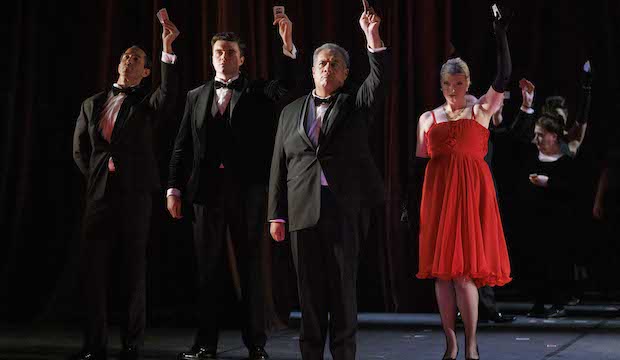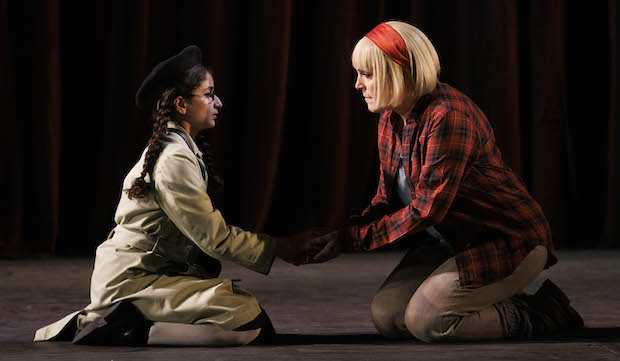La Traviata, English National Opera review ★★★★★
Nicole Chevalier is an impressive Violetta in Verdi's tragic opera
Nicole Chevalier is party-loving Violetta in La Traviata. Photo: Belinda Jiao
Which instruments would you take out of the orchestra? The harp that brokers a lovers’ exchange? The brass that sounds the alarm? The singing high strings, telling a wordless story? This cull won’t apply to English National Opera’s current production of La Traviata, in revival at the Coliseum. But it’s on the cards for productions ahead.
Of 69 players, 19 are to get the chop, others to be put on part-time contracts. That’s like England playing Germany in the Euros with eight men. Leave out the goalkeeper, perhaps. Like the harp, he doesn’t do much a lot of the time.
Under conductor Richard Farnes, with this threat hanging over it, the Orchestra of English National Opera gave its all on the opening night, cheerfully coming on stage for the curtain calls, but how many more times does ENO have to be the punchbag in this government’s vicious assault on the arts? For this decision to drop players is forced by solely by funding cuts, feeble Arts Council England wielding the knife, spuriously ‘levelling up’.
Yet ENO sings on and plays on, but its Traviata is aptly heavy with menace and violent undercurrents. Cut down (repeats and set pieces are removed), and with a rather clunky translation by Martin Fitzpatrick, it was originally directed by Peter Konwitchsny and is revived here by Ruth Knight.

Flora (Amy Holyland) and friends party on. Photo: Belinda Jiao
Set in the 1950s, with a Dior New Look dress for party girl Violetta and a beatnik cardigan, duffel coat and horn-rimmed specs for unlikely lover Alfredo, the story of doomed love is played out with the help of a single, hard chair and a thicket of blood-red drapes.
The indefatigable Chorus of English National Opera, also under threat, peoples this empty stage with simple, telling, props – champagne glasses that say drink is king, playing cards that signal life is a gamble, knives and forks that tuck with relish into Violetta’s downfall. But Johannes Leiacker’s set design shows us nothing of the contrast between Violetta’s racy city life and her country idyll with Alfredo. Costumes are more helpful, Violetta swopping her red cocktail down for a check shirt and chinos.
As Violetta, the society hostess secretly nursing a terminal illness, American-born soprano Nicole Chevalier displays the whole, vast range of her vocal expression, swooping luxuriously up to her top notes when in affluent company, down to earth when alone with Alfredo, a torch song chanteuse when emotions run high. She fills the big empty space all on her own, turning to sing upstage with no less of sound or presence. It’s a remarkable performance.
Her Alfredo is sung by Argentinian-Spanish-American tenor Jose Simerilla Romero, making his ENO debut. Likeably bookish and geeky he was a fraction underpowered on first night, but he has been unwell. Also recovering was ENO baritone old hand Roland Wood as his father, who demands Violetta end a relationship that brings shame on the whole family.
But Alexandre Dumas set his play, La Dame aux Camellias, on which Verdi based his opera, a century earlier that the staging here. Whereas a scandal could taint the marriage prospects of Alfredo’s sister in the 1850s, by the 1950s it was almost de rigueur for every family of nobs to have at least one black sheep. Think of the Marquis of Bath, Eccentric of Longleat….

Summah Chanda as Alfredo's sister and Nicole Chevalier as Violetta. Photo: Belinda Jaio
Wood pleads his daughter’s case in the manner of a local activist proposing to raise the speed limit outside the primary school – with malicious sophistry, but persuasively sung. In this production he is accompanied to Violetta’s country hideaway by the daughter herself, said to be in love and betrothed, but Summah Chandi looks about 12, with her bobbysocks and pigtails. The usually fascinating connection between Violetta and another, unseen, woman, is lost.
Inevitably, the ever-shifting curtains, concealing and revealing, fall. Inevitably, Violetta is stripped down to a flimsy black shift, never the best wear for a patient with TB. Lucky that Alfredo left his cardi behind when they fell out.
There is good news too. Three ENO Harewood Artists, perfecting their opera skills with the company, make eye-catching appearances – strong-voiced and impressive mezzo-soprano Amy Holyland as Violetta’s friend, Flora; South African tenor Zwakele Tshabalala as Gaston, and Patrick Alexander Keefe as Flora’s marquis friend. Listen out for all of these in the future.
English National Opera helps train the next generation of international singers, a great British export, like so much live music. It takes a special kind of spite to chip away at a company like this.
La Traviata is sung in English with English surtitles. It is a co-production with Opera Graz, Austria. Further performances are on 26, 28 Oct; 2, 4, 7, 10, 12 Nov. Violetta is sung on 7 Nov by Gabriella Cassidy
Of 69 players, 19 are to get the chop, others to be put on part-time contracts. That’s like England playing Germany in the Euros with eight men. Leave out the goalkeeper, perhaps. Like the harp, he doesn’t do much a lot of the time.
Under conductor Richard Farnes, with this threat hanging over it, the Orchestra of English National Opera gave its all on the opening night, cheerfully coming on stage for the curtain calls, but how many more times does ENO have to be the punchbag in this government’s vicious assault on the arts? For this decision to drop players is forced by solely by funding cuts, feeble Arts Council England wielding the knife, spuriously ‘levelling up’.
Yet ENO sings on and plays on, but its Traviata is aptly heavy with menace and violent undercurrents. Cut down (repeats and set pieces are removed), and with a rather clunky translation by Martin Fitzpatrick, it was originally directed by Peter Konwitchsny and is revived here by Ruth Knight.

Flora (Amy Holyland) and friends party on. Photo: Belinda Jiao
Set in the 1950s, with a Dior New Look dress for party girl Violetta and a beatnik cardigan, duffel coat and horn-rimmed specs for unlikely lover Alfredo, the story of doomed love is played out with the help of a single, hard chair and a thicket of blood-red drapes.
The indefatigable Chorus of English National Opera, also under threat, peoples this empty stage with simple, telling, props – champagne glasses that say drink is king, playing cards that signal life is a gamble, knives and forks that tuck with relish into Violetta’s downfall. But Johannes Leiacker’s set design shows us nothing of the contrast between Violetta’s racy city life and her country idyll with Alfredo. Costumes are more helpful, Violetta swopping her red cocktail down for a check shirt and chinos.
As Violetta, the society hostess secretly nursing a terminal illness, American-born soprano Nicole Chevalier displays the whole, vast range of her vocal expression, swooping luxuriously up to her top notes when in affluent company, down to earth when alone with Alfredo, a torch song chanteuse when emotions run high. She fills the big empty space all on her own, turning to sing upstage with no less of sound or presence. It’s a remarkable performance.
Her Alfredo is sung by Argentinian-Spanish-American tenor Jose Simerilla Romero, making his ENO debut. Likeably bookish and geeky he was a fraction underpowered on first night, but he has been unwell. Also recovering was ENO baritone old hand Roland Wood as his father, who demands Violetta end a relationship that brings shame on the whole family.
But Alexandre Dumas set his play, La Dame aux Camellias, on which Verdi based his opera, a century earlier that the staging here. Whereas a scandal could taint the marriage prospects of Alfredo’s sister in the 1850s, by the 1950s it was almost de rigueur for every family of nobs to have at least one black sheep. Think of the Marquis of Bath, Eccentric of Longleat….

Summah Chanda as Alfredo's sister and Nicole Chevalier as Violetta. Photo: Belinda Jaio
Wood pleads his daughter’s case in the manner of a local activist proposing to raise the speed limit outside the primary school – with malicious sophistry, but persuasively sung. In this production he is accompanied to Violetta’s country hideaway by the daughter herself, said to be in love and betrothed, but Summah Chandi looks about 12, with her bobbysocks and pigtails. The usually fascinating connection between Violetta and another, unseen, woman, is lost.
Inevitably, the ever-shifting curtains, concealing and revealing, fall. Inevitably, Violetta is stripped down to a flimsy black shift, never the best wear for a patient with TB. Lucky that Alfredo left his cardi behind when they fell out.
There is good news too. Three ENO Harewood Artists, perfecting their opera skills with the company, make eye-catching appearances – strong-voiced and impressive mezzo-soprano Amy Holyland as Violetta’s friend, Flora; South African tenor Zwakele Tshabalala as Gaston, and Patrick Alexander Keefe as Flora’s marquis friend. Listen out for all of these in the future.
English National Opera helps train the next generation of international singers, a great British export, like so much live music. It takes a special kind of spite to chip away at a company like this.
La Traviata is sung in English with English surtitles. It is a co-production with Opera Graz, Austria. Further performances are on 26, 28 Oct; 2, 4, 7, 10, 12 Nov. Violetta is sung on 7 Nov by Gabriella Cassidy
TRY CULTURE WHISPER
Receive free tickets & insider tips to unlock the best of London — direct to your inbox
| What | La Traviata, English National Opera review |
| Where | English National Opera, London Coliseum, St Martin's Lane, London, WC2N 4ES | MAP |
| Nearest tube | Charing Cross (underground) |
| When |
23 Oct 23 – 12 Nov 23, Eight performances, start times vary. Running time 1hr 50min with no interval |
| Price | £10-£160 |
| Website | Click here to book via the ENO’s website. |